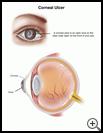
Corneal Ulcer
________________________________________________________________________
KEY POINTS
- A corneal ulcer is an open sore on the clear outer layer on the front of your eye. Most corneal ulcers are caused by an infection.
- Treatment depends on the cause of the ulcer. You may be given eye drops or ointment to treat an infection and to help the pain. In some cases, you may need contact lenses, laser treatment, or surgery.
________________________________________________________________________
What is a corneal ulcer?
A corneal ulcer is an open sore on the surface of the cornea. The cornea is the clear outer layer on the front of your eye.
The cornea, which is usually clear, gets irritated and cloudy, which causes blurry vision. A corneal ulcer is very serious. It can lead to problems that can cause blindness or even loss of your eye if not treated right away.
What is the cause?
Most corneal ulcers are caused by an infection that starts after there is a tiny break on the surface of the cornea such as:
- Scratches from any object, such as a finger, comb, splinter, makeup or contact lens.
- Long term dry eyes
- Burns from the sun, welding, heat or chemicals
You are more likely to get a corneal ulcer if your cornea is weakened by a condition such as rheumatoid arthritis or other problems with your immune system. Some types of infections, such as herpes or shingles, can cause a corneal ulcer even if there are no breaks on the surface of the cornea.
What are the symptoms?
Symptoms may include:
- Redness in your eye
- Watery, yellow, or green discharge from your eye
- Pain, a scratchy feeling, or feeling like there is something in your eye
- Painful sensitivity to light
- Blurry vision
How is it diagnosed?
Your eye care provider will ask about your symptoms and medical history and may do exams and tests such as:
- An exam using a microscope with a light attached, called a slit lamp, to look closely at your cornea
- An exam using drops to enlarge, or dilate, your pupils and a light to look into the back of your eyes
- Biopsy or corneal culture, which is the removal of a tiny sample of tissue for testing to find the cause of the infection
- An ultrasound, which uses sound waves to show pictures of the back of your eye
- Blood tests to check if your corneal ulcer may be related to a medical condition
How is it treated?
Treatment depends on the cause of the ulcer. You may be given eye drops or ointment to treat an infection and to help the pain.
Most corneal ulcers get better with treatment, although it can take a long time to heal. You may need frequent, or even daily, eye exams. Sometimes, the ulcer causes the cornea to get so thin that a hole develops. This is an emergency that usually requires surgery to treat.
Severe corneal ulcers can cause a permanent scar. If this scar affects your vision, you may need contact lenses, laser treatment, or surgery.
How can I take care of myself?
Follow the full course of treatment your healthcare provider prescribes. Ask your healthcare provider:
- How and when you will get your test results
- How long it will take to recover
- If there are activities you should avoid and when you can return to your normal activities
- How to take care of yourself at home
- What symptoms or problems you should watch for and what to do if you have them
Make sure you know when you should come back for a checkup. Keep all appointments for provider visits or tests.
How can I help prevent a corneal ulcer?
- Ask your eye care provider if you should use drops to prevent dry eyes.
- Have regular eye exams, especially if you have a health condition such as rheumatoid arthritis.
- To help prevent severe eye injuries, wear safety eyewear when you:
- Do any work around the house that requires hammering, power tools, chemicals, or splatter of any kind
- Play paintball, racquetball, lacrosse, hockey, and fast-pitch softball
- Shoot firearms or use explosives of any kind
- Are in a high-risk area such as a construction site or shooting range
- Follow your eye care provider's instructions for wearing and caring for contact lenses. Be very careful with cleaning your contact lenses and never sleep in them. Do not wear them longer than recommended. Do not wash them in tap water and do not wear them while swimming or while in a hot tub.

